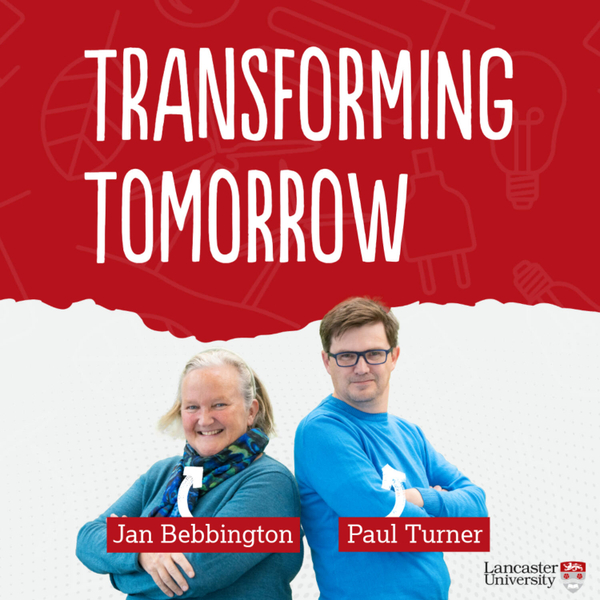
Bring back the accountants – and the taskforces! It’s time to look at how companies identify and report on nature-related impacts and opportunities.
We make an investigation of the Taskforce on Nature-related Financial Disclosures (TNFD) and its work with the Pentland Centre’s Dr Neytullah Ciftci – Neo to his friends – who works with Jan on that very topic.
Discover how companies can change nature; how these changing ecosystems could be a risk to your business; and the importance of analysing supply chain impacts as well as your own operations.
We look at how companies are adapting to the TNFD framework, and how widespread reporting is; discuss how TNFD fits in with the Taskforce on Climate-related Financial Disclosures (TCFD); gain an understanding of the different biodiversity scenarios for companies looking up to 100 years into the future; and hear Paul wonder if he knows too many accounting acronyms.
Reporting under the TNFD is moving quickly, with new reports expanding our understanding of the reporting framework. Here are the four most complete biodiversity scenarios within TNFD reports we have found to date, and the TNFD’s guide on scenario analysis.
KAO TNFD Report: https://www.kao.com/content/dam/sites/kao/www-kao-com/global/en/sustainability/pdf/biodiversity-tnfd.pdf
Kyuden Group Integrated Report 2024:
https://www.kyuden.co.jp/english_company_news_2024_h240925-1.html
Norinchuking Climate & Nature Report 2024: https://www.nochubank.or.jp/en/sustainability/backnumber/pdf/2024/climate_nature.pdf
Sekisui TCFD & TNFD Report 2024: https://www.sekisuichemical.com/sustainability_report/pdf/2024_TCFD_TNFDReport_E.pdf
TNFD (2023) Guidance: https://tnfd.global/publication/guidance-on-scenario-analysis/
Find out more about Neo and his work here: https://www.lancaster.ac.uk/lums/people/neytullah-ciftci
And catch-up on the previous episode that covered the TCFD with Duncan Pollard here: https://pod.fo/e/272bf5
Transforming Tomorrow
Sustainability is a key consideration for any contemporary business, from biodiversity to modern slavery, seabeds to factory floors. On Transforming Tomorrow, we’ll guide you through the complex, ever-changing and often exciting (yes, really!!) world of sustainability in business. Alongside members of the Pentland Centre, academic experts, and business leaders, we cover the theory and practice of mainstreaming social and environmental sustainability into purposeful business strategy and performance.
Whether you are leading change in your business, or just want to know more about how asteroid mining may influence the future of sustainability, Transforming Tomorrow is the show for you.
Taking you through it all are your hosts, Jan and Paul, who bring insight, perspective, and not a little amount of disagreement, to all the subjects.
Join us every Monday to uncover new insights and become a little more inspired that you can make a difference in sustainability.
You can find transcripts for most episodes at: https://www.lancaster.ac.uk/pentland/resources-for-education-and-practice/transforming-tomorrow-podcast/transcripts/
Send your questions on any of the issues we discuss in Transforming Tomorrow to [email protected] or fill in our feedback form here: https://forms.office.com/e/7Bw4rDiRDt
Find out more about the Pentland Centre and its work here: https://www.lancaster.ac.uk/pentland/
https://doc.your-brochure-online.co.uk/Lancaster-University_Transforming-Tomorrow/
Meet the Hosts
Professor Jan Bebbington is the Director of the Pentland Centre for Sustainability in Business at Lancaster University. Jan is an expert on accounting, benchmarking (to her co-host’s annoyance), and how business and sustainability intersect.
Jan loves nature and wants to protect it – and hopes she can change the world (ideally for the better). She is also motivated to address inequality wherever it is found and especially to eliminate forced, bonded or child labour. Transforming Tomorrow is one small step on that quest.
Paul Turner is a former sports journalist who now works promoting the research activities in Lancaster University Management School – a poacher turned gamekeeper as his former colleagues would have it.
Paul has always been interested in nature and the natural environment – it comes from growing up in Cumbria – and has been a vocal proponent of the work of the Pentland Centre since joining Lancaster University. He does not like rankings and benchmarking, and is not afraid to say so.